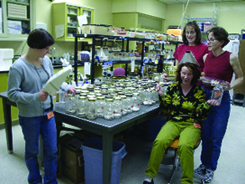Investing in excellence
 One of K-State's priorities for elevating the institution's national and international success is the Targeted Excellence program, which made its first awards in 2004. Awards have helped inter-disciplinary teams in such diverse areas as food safety and security, the Developing Scholars Program, ecological genomics, civic discourse and democracy, geographic information systems, sensors research, nanotechnology, and improving access to careers in science, technology, engineering and mathematics.
One of K-State's priorities for elevating the institution's national and international success is the Targeted Excellence program, which made its first awards in 2004. Awards have helped inter-disciplinary teams in such diverse areas as food safety and security, the Developing Scholars Program, ecological genomics, civic discourse and democracy, geographic information systems, sensors research, nanotechnology, and improving access to careers in science, technology, engineering and mathematics.
"The Targeted Excellence program is a strategic investment designed to foster collaboration across disciplines," said M. Duane Nellis, K-State's provost and senior vice president. "These investments have truly created significant seed support that has allowed us to leverage our competitive position for extramural sources while enhancing our research and learning environment for the university."
The Targeted Excellence program is a competitive university initiative that supports cooperative, interdisciplinary programs that show promise of elevating K-State's stature as a premier land-grant institution. Projects selected for funding must also have a direct impact on the lives of Kansans.
Thirty-one projects have been funded to date, involving 86 faculty from seven colleges, as well as the library, and the offices of student life and the provost. Approximately $6.9 million has so far been expended, which has brought in over $89.5 million in extramural grants. "Being able to leverage that kind of external investment is critical to maintaining K-State's high quality research program and to taking it to the next level." Nellis said. "That's what Targeted Excellence is all about."
An important portion of the investments has been in the areas of animal health and food safety research, which surely played a role in the recent siting of the National Bio and Agro-defense Facility adjacent to campus, Nellis indicated.
Targeted Excellence awards in the agriculture and animal health arenas have involved food safety and security, biomaterials, geographic information systems, beef cattle, arthropod genomics and several other genome biology projects.
Additional projects in other disciplines are many and diverse. They include: analyzing the environmental security of aircraft cabins; investigating and cataloging the importance of the grasslands, prairie plants, and insects; coordinating efforts in sustainable energy; and funding breakthroughs in stem cell biology. Projects investigating issues involving African and Asian countries have also been supported, as well as military history and security studies.
"The success of these research and learning initiatives has allowed K-State to enhance our position as a major land grant university," Nellis said.
Photo: K-State researchers involved in sequencing the red flour beetle genome - a Targeted Excellence funded project - show off the jars of beetles they had to have to isolate enough DNA for their project. (Courtesy photo)